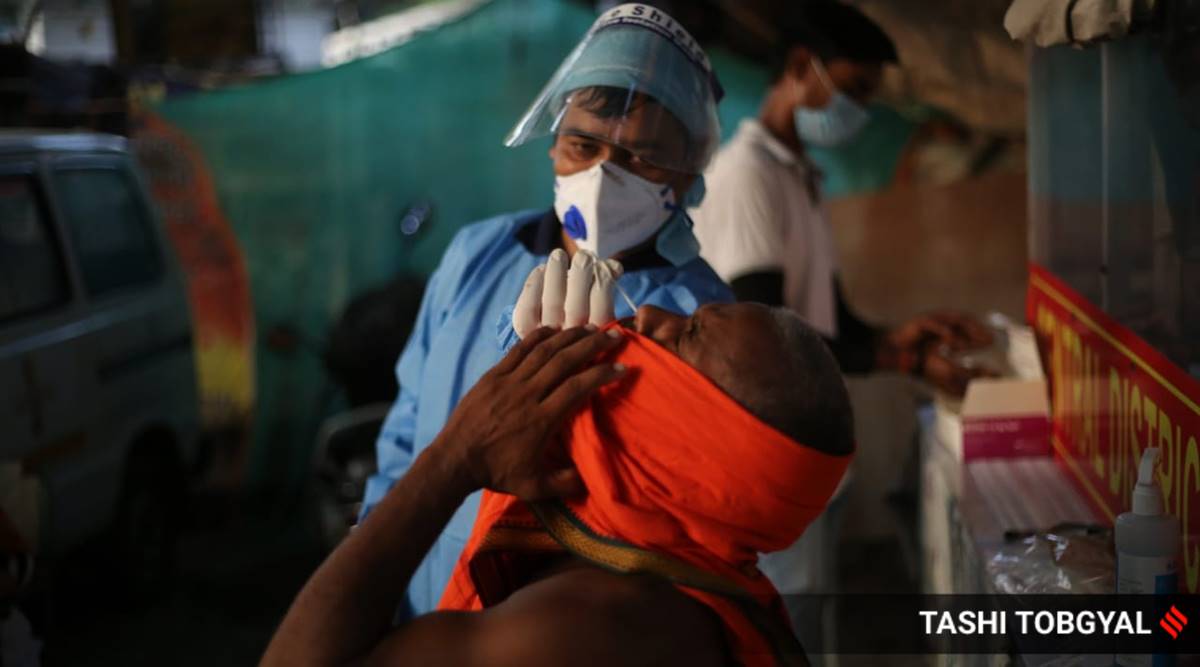 Construction labourers get screened for Covid 19 in the capital New Delhi. (Express Photograph by Tashi Tobgyal)
Construction labourers get screened for Covid 19 in the capital New Delhi. (Express Photograph by Tashi Tobgyal)Hyderabad-headquartered Bharat Biotech on Wednesday announced it would be manufacturing up to a billion doses of a single-dose intranasal Covid-19 vaccine in collaboration with the Washington University School of Medicine in St Louis, Missouri. The agreement is expected to help overcome potential difficulties with distributing the vaccine, like the high cost of vaccination or a possible shortage of personnel to administer the doses to the required population.
The company, which has entered into a licensing agreement with the university for the novel chimp-adenovirus candidate, owns the rights to distribute it “in all markets” except the United States, Japan, and Europe.
While the phase I human trials will take place at the Treatment Evaluation Unit of Saint Louis University (SLU), also in St Louis, Missouri, Bharat Biotech is expected to undertake further stages of the clinical trials in India “upon obtaining the required regulatory approval”, the company said in a release.
Quixplained: When will Covid-19 vaccine be ready? A look at the progress of top candidates
Bharat Biotech will also undertake large-scale manufacturing of the vaccine at its facility located in Genome Valley, Hyderabad.
Adenovirus vaccines are basically vaccines that use a genetically modified virus to carry a code for the cells in the human body to produce the spiky outer layer (spike protein) of the SARS-CoV-2 virus. This is expected to help the body recognise this spike protein as a foreign substance and build an immune response against it so that it can tackle the real virus when it tries to infect.
Other adenovirus vaccine candidates being tested in India include Covishield, which has been developed by the University of Oxford in collaboration with AstraZeneca and is known internationally as AZD1222 (the so-called “Oxford vaccine), and Sputnik V, developed by the Gamaleya Research Institute in Moscow (the so-called “Russian vaccine”). Unlike the Washington University candidate, both of these candidates are injectable vaccines.
“We envision that we will scale this vaccine to one billion doses, translating to one billion individuals vaccinated receiving a single-dose regimen,” said Dr Krishna Ella, Chairman and Managing Director, Bharat Biotech. “An intranasal vaccine will not only be simple to administer but reduce the use of medical consumables such as needles, syringes, etc., significantly impacting the overall cost of a vaccination drive,” he added.
“The ability to accomplish effective immunisation with a single nasal dose is a major advantage, offering broader reach and easier administration,” said Dr David T Curiel, Director of Biologic Therapeutics Center and Professor of Radiation Oncology at Washington University School of Medicine in St Louis.
“An effective nasal dose not only protects against COVID-19, but it also prevents the spread of the disease by offering another kind of immunity that occurs primarily in the cells that line the nose and throat. Most other vaccine candidates currently under development can’t do that,” he added.
📣 The Indian Express is now on Telegram. Click here to join our channel (@indianexpress) and stay updated with the latest headlines
For all the latest India News, download Indian Express App.
© The Indian Express (P) Ltd
tinyurlis.gdu.nuclck.ruulvis.netshrtco.de
مقالات مشابه
- هدرز پراید یورو 4 فولادی - اگزوز خودرو مشهد
- شرکت صادرات و واردات کالاهای مختلف از جمله کاشی و سرامیک و ارائه دهنده خدمات ترانزیت و بارگیری دریایی و ریلی و ترخیص کالا برای کشورهای مختلف از جمله روسیه و کشورهای حوزه cis و سایر نقاط جهان - بازرگانی علی قانعی
- شرکت صادرات و واردات کالاهای مختلف از جمله کاشی و سرامیک و ارائه دهنده خدمات ترانزیت و بارگیری دریایی و ریلی و ترخیص کالا برای کشورهای مختلف از جمله روسیه و کشورهای حوزه cis و سایر نقاط جهان - بازرگانی علی قانعی
- زیر جدید ICC دستورالعمل خواهد بود یک چالش: Sangakkara
- گجرات: تاجر یافت سوخته به مرگ در پلنپور پلیس مظنون به قتل
- کرالا: با سخت Covid اقدامات رها کردن در مورد آنفلوآنزای
- تایلر میلر جدید ارضا روی صورت, مو, hairy mature, مینه سوتا, ایالات پس از پیروزی
- کربن فعال شده گرانول | تجهیز یار
- یکنواخت در سرتاسر کشور در اوج در COVID-19 موارد را نمی خواهد اتفاق می افتد: کارشناس
- شرکت صادرات و واردات کالاهای مختلف از جمله کاشی و سرامیک و ارائه دهنده خدمات ترانزیت و بارگیری دریایی و ریلی و ترخیص کالا برای کشورهای مختلف از جمله روسیه و کشورهای حوزه cis و سایر نقاط جهان - بازرگانی علی قانعی